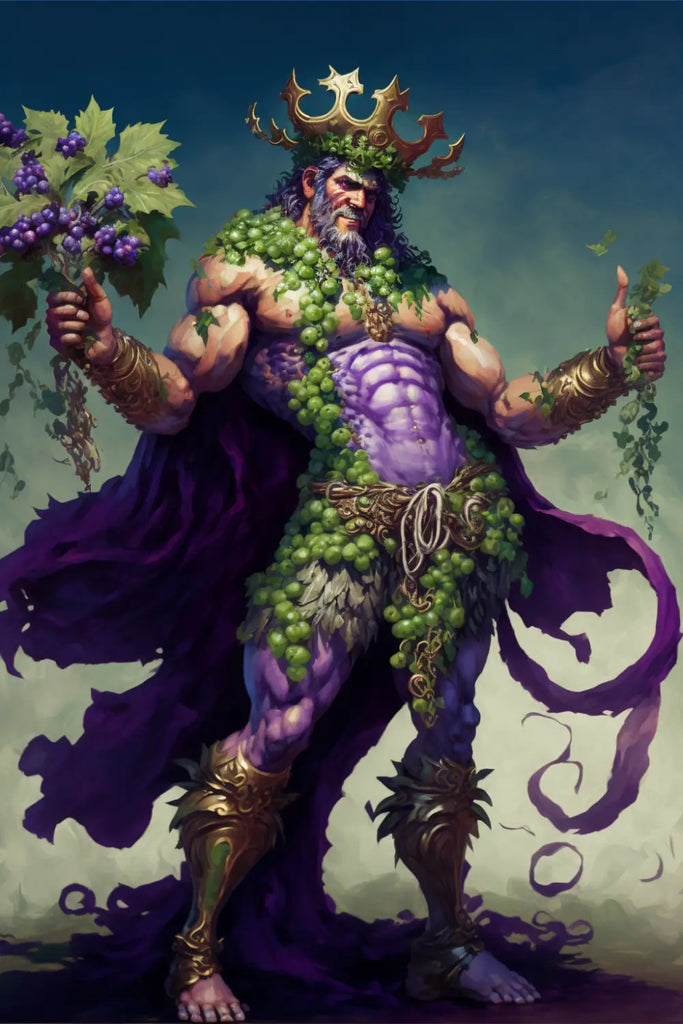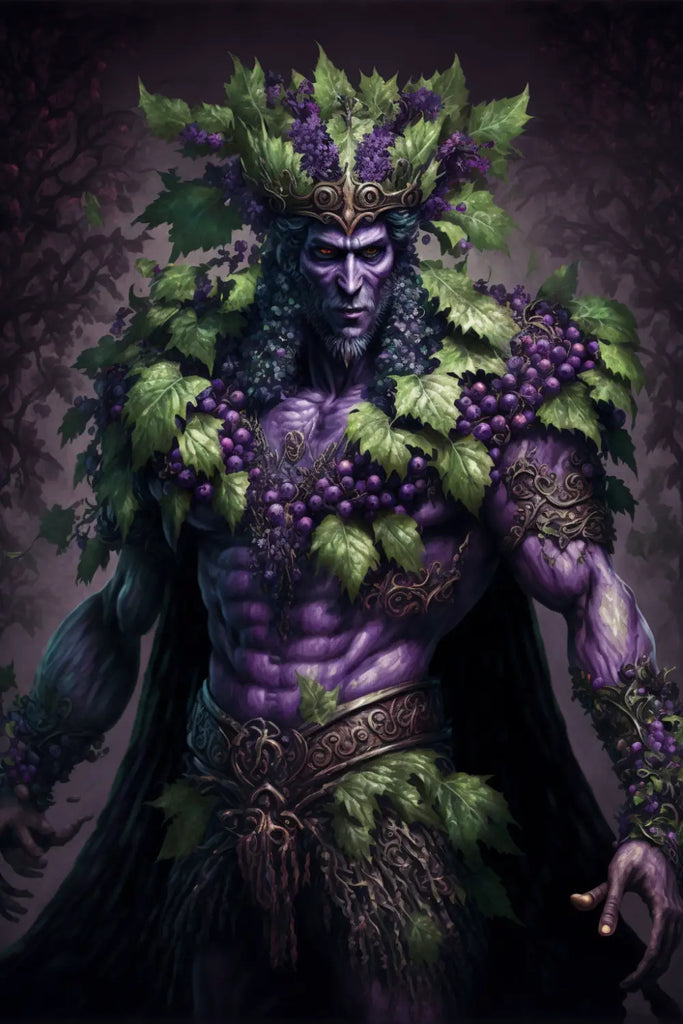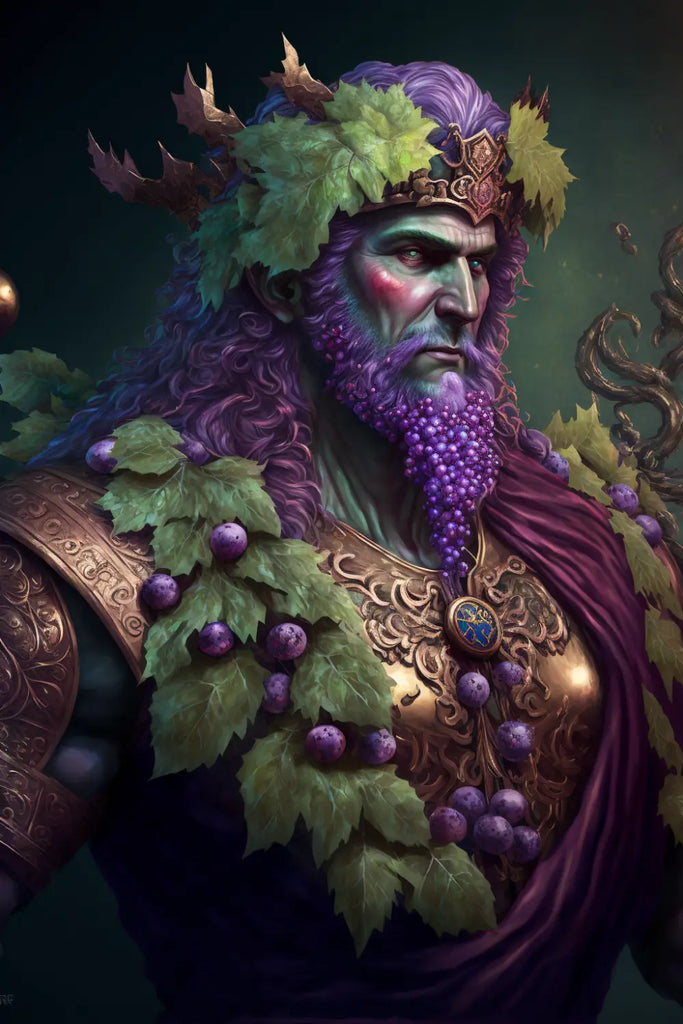Once upon a time, in the divine realms of Mount Olympus, Dionysus, the God of Wine, was preparing for his annual feast. As the epitome of revelry and pleasure, Dionysus held a special place in the pantheon of Greek gods. With his lush, flowing hair and chiseled features, he was beloved by many and known for his ability to turn even the dreariest of gatherings into joyous, unforgettable occasions.
One fateful evening, Dionysus decided to host a grand celebration in honor of his beloved nymphs and satyrs. As the preparations were underway, he sought to create the perfect elixir that would enliven the festivities like never before. He called upon his most talented winemakers and instructed them to concoct a unique blend of ambrosial wine.
The winemakers worked tirelessly, combining the sweetest fruits and the most fragrant of herbs, all while infusing the mixture with the essence of the gods themselves. This divine creation was a masterpiece: a wine so potent, so delicious, that it could make the gods themselves forget their immortal worries and simply indulge in the pleasures of the moment.

As the day of the grand celebration drew near, Dionysus eagerly awaited the first taste of his extraordinary creation. The winemakers, proud of their handiwork, presented the God of Wine with a chalice filled with the ambrosial elixir. Dionysus took a sip, and his eyes widened in delight. The wine was truly the epitome of perfection, and he could hardly contain his excitement for the upcoming festivities.
The night of the grand celebration finally arrived, and the halls of Mount Olympus were filled with the laughter and merriment of gods, nymphs, and satyrs alike. The ambrosial wine flowed freely, and the divine guests could not help but indulge in its intoxicating aroma and unparalleled flavor.
As the night wore on, however, the effects of the powerful ambrosial wine began to show. Dionysus, usually known for his charismatic presence and boundless energy, was slumped in his throne, clearly inebriated. His cheeks were flushed, and his speech was slurred as he attempted to entertain his guests with amusing anecdotes and jests.
The other gods, too, were faring no better. Normally stoic and composed, they were now dancing wildly, singing off-key, and engaging in all manners of raucous behavior. Aphrodite, the Goddess of Love, was giggling uncontrollably as she flirted with every deity in sight. Meanwhile, Ares, the fearsome God of War, had been reduced to a blubbering mess, tearfully confessing his love for his fellow gods and goddesses.
This unprecedented chaos soon caught the attention of Zeus, the King of the Gods. As he surveyed the unruly scene before him, his eyes narrowed in disapproval. With a clap of his mighty hands, he summoned a bolt of lightning, instantly silencing the cacophony of laughter and music.

Zeus's booming voice echoed through the halls, demanding an explanation for the pandemonium. Dionysus, struggling to maintain his composure, sheepishly admitted to his role in creating the ambrosial wine. Zeus, displeased with Dionysus's recklessness, decided that a lesson in humility was in order.
As punishment for his transgression, Dionysus was banished from Mount Olympus and sent to live among mortals for a time. Stripped of his divine powers and bearing the weight of his shame, Dionysus began to wander the earth, seeking redemption and a way to regain the favor of his fellow gods.
In his travels, Dionysus encountered many mortal beings who were fascinated by his tales of divine revelry and the wondrous ambrosial wine. Unable to resist the allure of sharing his divine knowledge, Dionysus taught these mortals the art of winemaking, thus imparting upon them a small taste of the heavenly nectar he had once crafted.
As the years passed, Dionysus's legend grew, and his followers multiplied. Vineyards flourished across the land, and wine became a symbol of joy, celebration, and camaraderie among mortals. The God of Wine, however, could not forget the humiliation he had endured at the hands of Zeus and longed for the day he could return to Mount Olympus and reclaim his rightful place among the pantheon.

Determined to make amends for his past mistakes, Dionysus hatched a plan to create a new, less potent version of the ambrosial wine that would still bring happiness and merriment but without the disastrous consequences that had befallen the gods on that fateful night. He enlisted the help of his mortal followers and, using their newfound winemaking skills, they created a divine yet balanced wine that was more suited to the mortal world.
With this new creation in hand, Dionysus decided it was time to present his offering to Zeus and petition for his return to the divine realm. He scaled the treacherous slopes of Mount Olympus, his heart pounding with anticipation and fear. As he approached the throne of Zeus, he knelt before the mighty god and presented his gift with a humble plea for forgiveness.
Zeus, intrigued by the potential of this new wine, took a cautious sip. His stern expression softened as the familiar warmth and pleasure of the ambrosial nectar washed over him, yet he remained clear-headed and in control. Impressed by Dionysus's dedication to his craft and his willingness to learn from his past transgressions, Zeus granted the repentant god his place among the pantheon once more.
From that day forward, Dionysus became the patron of responsible revelry and the perfect balance of pleasure and restraint. The grand celebration that had once ended in chaos and banishment was now remembered as a turning point in the life of the God of Wine, and the tale of his redemption served as a reminder that even the most divine of beings could learn from their mistakes.
















